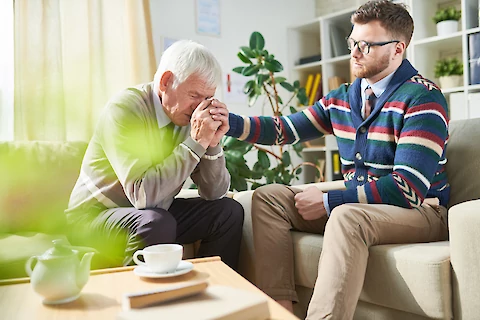
There has been a growing awareness of mental health issues in recent years. This important and long-overdue awareness should cover all age groups, including seniors. This is especially crucial when dealing with Major Depressive Disorder (MDD). It is a mental health condition that can affect seniors differently than younger people.
This Senior Helpers blog post sheds light on the unique challenges and manifestations of MDD in seniors. By promoting understanding and dispelling misconceptions about mental health in later life, we can help our loved ones lead more fulfilling, healthy lives in their twilight years.
Major Depressive Disorder in Seniors
Major Depressive Disorder in seniors is more than just feeling unhappy or blue for a few days. It is a complex mental health condition that affects a person's mood, physical health, and overall quality of life. Unlike in younger adults, MDD in seniors often gets mistaken for a part of natural aging or overlooked due to coexisting physical illnesses. Misconceptions like these can delay effective treatment, worsening the person's suffering.
Symptoms of Major Depressive Disorder
It is crucial to note that depression in seniors doesn't always look the same as it does in younger people. Besides persistent sadness, symptoms like loss of interest in activities, unexplained aches and pains, memory impairments, and even changes in weight or sleep patterns are common. The challenge lies in differentiating these symptoms from “normal” signs of aging or side effects of medications. Early detection and diagnosis are critical. It can also significantly improve the mental well-being of the seniors we love.
Managing Symptoms of Major Depressive Disorder
Managing MDD doesn't solely rely on medication strategies or taking antidepressants. Lifestyle modifications can go a long way in managing depressive symptoms. Encourage seniors to participate in activities they enjoy and help them stay socially active. Promoting a healthy diet and regular physical exercise can also contribute to a better mental health state. Remember to consult with healthcare professionals before starting any new exercise routine. Isolation can worsen depressive symptoms, so keeping the lines of communication open and staying connected with your loved ones is critical.
When to Seek Professional Help
While support from family and lifestyle changes are essential, professional help is often necessary for managing MDD. It is time to seek professional help when symptoms persist and hinder daily life. Mental health professionals, including therapists, counselors, and psychiatrists, can provide a comprehensive treatment plan that could include medications, therapy, lifestyle changes, and more. These professionals are trained to cater to the unique needs of the senior, ensuring a holistic approach to treating MDD.
Senior Helpers Murrells Inlet Can Help
Supporting a senior loved one dealing with a major depressive disorder comes with many challenges. However, with understanding, compassion, and proper professional help, it can be done. If you’re in Murrells Inlet, Myrtle Beach, North Myrtle Beach, or Georgetown areas, and need compassionate, professional support at home, Senior Helpers Murrells Inlet can help. We offer quality, in-home senior care services streamlined to meet the specific needs of our senior community and their families. Contact us today to know how we can make the journey easier for you or your elderly loved one.